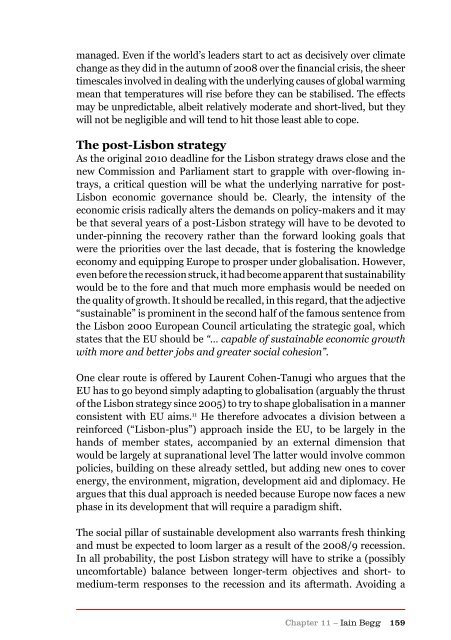Authors Iain Begg | Gabriel Glöckler | Anke Hassel ... - The Europaeum
Authors Iain Begg | Gabriel Glöckler | Anke Hassel ... - The Europaeum
Authors Iain Begg | Gabriel Glöckler | Anke Hassel ... - The Europaeum
You also want an ePaper? Increase the reach of your titles
YUMPU automatically turns print PDFs into web optimized ePapers that Google loves.
managed. Even if the world’s leaders start to act as decisively over climate<br />
change as they did in the autumn of 2008 over the financial crisis, the sheer<br />
timescales involved in dealing with the underlying causes of global warming<br />
mean that temperatures will rise before they can be stabilised. <strong>The</strong> effects<br />
may be unpredictable, albeit relatively moderate and short-lived, but they<br />
will not be negligible and will tend to hit those least able to cope.<br />
<strong>The</strong> post-Lisbon strategy<br />
As the original 2010 deadline for the Lisbon strategy draws close and the<br />
new Commission and Parliament start to grapple with over-flowing intrays,<br />
a critical question will be what the underlying narrative for post-<br />
Lisbon economic governance should be. Clearly, the intensity of the<br />
economic crisis radically alters the demands on policy-makers and it may<br />
be that several years of a post-Lisbon strategy will have to be devoted to<br />
under-pinning the recovery rather than the forward looking goals that<br />
were the priorities over the last decade, that is fostering the knowledge<br />
economy and equipping Europe to prosper under globalisation. However,<br />
even before the recession struck, it had become apparent that sustainability<br />
would be to the fore and that much more emphasis would be needed on<br />
the quality of growth. It should be recalled, in this regard, that the adjective<br />
“sustainable” is prominent in the second half of the famous sentence from<br />
the Lisbon 2000 European Council articulating the strategic goal, which<br />
states that the EU should be “… capable of sustainable economic growth<br />
with more and better jobs and greater social cohesion”.<br />
One clear route is offered by Laurent Cohen-Tanugi who argues that the<br />
EU has to go beyond simply adapting to globalisation (arguably the thrust<br />
of the Lisbon strategy since 2005) to try to shape globalisation in a manner<br />
consistent with EU aims. 11 He therefore advocates a division between a<br />
reinforced (“Lisbon-plus”) approach inside the EU, to be largely in the<br />
hands of member states, accompanied by an external dimension that<br />
would be largely at supranational level <strong>The</strong> latter would involve common<br />
policies, building on these already settled, but adding new ones to cover<br />
energy, the environment, migration, development aid and diplomacy. He<br />
argues that this dual approach is needed because Europe now faces a new<br />
phase in its development that will require a paradigm shift.<br />
<strong>The</strong> social pillar of sustainable development also warrants fresh thinking<br />
and must be expected to loom larger as a result of the 2008/9 recession.<br />
In all probability, the post Lisbon strategy will have to strike a (possibly<br />
uncomfortable) balance between longer-term objectives and short- to<br />
medium-term responses to the recession and its aftermath. Avoiding a<br />
Chapter 11 – <strong>Iain</strong> <strong>Begg</strong> 159

















